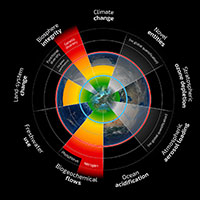
| Planetary Boundaries Now Crossed | 7 February 15 |

"Transgressing a boundary increases the risk that human activities could inadvertently drive the Earth System into a much less hospitable state, damaging efforts to reduce poverty and leading to a deterioration of human wellbeing in many parts of the world, including wealthy countries," says lead author, Professor Will Steffen, researcher at the Stockholm Resilience Centre and the Australian National University, Canberra. "In this new analysis we have improved our quantification of where these risks lie." "Planetary Boundaries do not dictate how human societies should develop but they can aid decision-makers by defining a safe operating space for humanity," says co-author Katherine Richardson from the Center for Macroecology, Evolution and Climate, University of Copenhagen.
View Stockholm Resilience Centre publication |
|
 Print version Print version |
Top |
